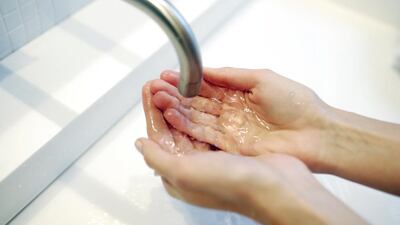Turning a new leaf: As part of The National's Earth Matters coverage, we look at some potential New Year's resolutions for the UAE to help the environment, in a series examining meat consumption, water conservation, food waste and driving habits.
Two of the most simple yet effective ways to save water are to recognise its worth — and to listen to music.
A tip gaining traction to conserve water is to put on a favourite song while in the shower. This is a way to appreciate the length of time being spent and how much water used.
Every minute in the shower uses about 10 litres of water, so shortening a cleaning routine to the length of a five-minute song each day can save almost 2,000 litres of water a year — per person.
Conservationists say tips such as this can help reduce water consumption in the UAE, which has one of the highest rates in the world at 550 litres per capita. Added to that, producing water in this country is also one of the most carbon-intensive processes there is.
“These are very deep issues and the leadership of the country recognises it. Water efficiency was embedded in the culture of this country for a long time — water is life,” said Tanzeed Alam, of the Emirates Wildlife Society-World Wildlife Fund. “Something has been lost in the development of the country that makes people waste water.”
Changing people’s habits are key, he said, as too is asking questions about how to save water.
Dr Mohammed Dawood, manager of natural resources policy at the Environment Agency Abu Dhabi, blamed the way of life in the UAE and the low cost of water for increasing usage.
“It is high because of many reasons: the standard of living is very high; there is indoor and outdoor use for landscaping; washing cars; swimming pools, the demand for this lifestyle creates an overburden of consumption in these areas,” he said. “Changes need to happen.”
Dr Dawood said the strongest deterrent to wasting water was perhaps to ensure the cost of water reflects its scarcity, something that Abu Dhabi Water and Electricity Authority is trying to redress with its increased tariffs being implemented from the beginning of this month.
Emiratis in Abu Dhabi emirate will pay 23 per cent more for their water and 34 per cent extra for electricity, while expatriates will see their water bills increase by 31.76 per cent, while electricity costs will rise by 27.6 per cent.
Adwea said the new tariffs have been introduced to boost environmental protection and sustainability. The average Emirati now pays Dh2.09 for 1,000 litres of water, which will almost certainly come from desalinated sources. To produce that amount of water at a desalination plant uses about one litre of petrol to produce the 4 kilowatts per hour needed to make it potable.
Offsetting that carbon by attaching value to the damage done to the environment — what many countries call a carbon tax — is still being discussed in the UAE.
Germany, for example, places a tax on every kWh at the rate of 8 fils. However, when it comes to the use of petroleum, which the UAE uses to power its desalination plants, the rate goes up to Dh2.5 per litre.
That means that the new water tariff for Emiratis in Abu Dhabi emirate wouldn’t even cover Germany’s carbon tax for the use of the petrol needed to produce that water, never mind the cost of the water in that country.
“The tariffs that people pay for water is very low and subsidised and the changes in tariffs in Abu Dhabi [will] start changing how people behave and how wasteful they are with water consumption,” said Mr Alam.
Increasing tariffs and reducing subsidies is a step in the right direction, Mr Alam added, as too is residents aiming to consume less water by following some simple tips.
“How many times do you need to wash your car a week, using a hose? There are some behavioural aspects that need to change, especially in people’s households,” he said.
Leaking pipes, inefficient appliances, wastefulness and maintaining gardens unfit for the climate are all factors that push the water consumption high.”
Dr Dawood said: “I don’t know about playing music in the shower but I sing and it’s changing the way you consume water that helps.”
_____
A New Leaf: Green resolutions for 2017:
› Calls to rethink UAE diet as UN study shows environmental damage of eating meat
› Eco-driving important for UAE until public transport serves needs
nalwasmi@thenational.ae

